Classics 301B
February 27, 2025
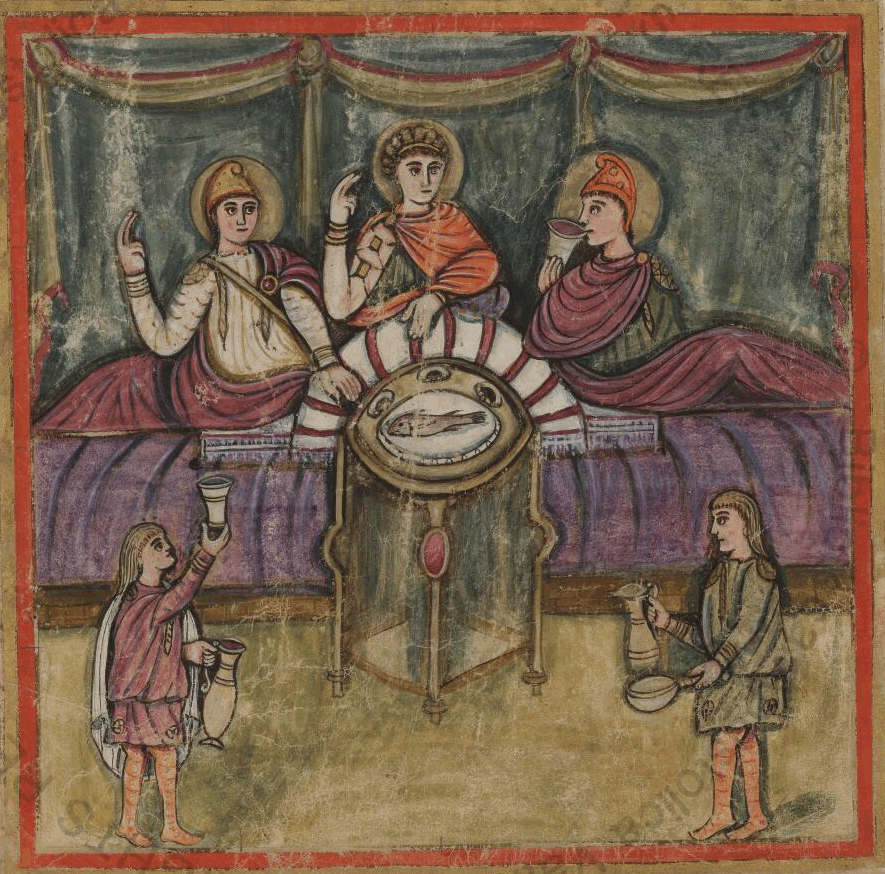
Dido's banquet ("Vergilius Romanus", 5th century CE illustrated manuscript)
Paper #1 *Topics*
Aeneid 2: Aeneas as narrator at Dido's lavish banquet
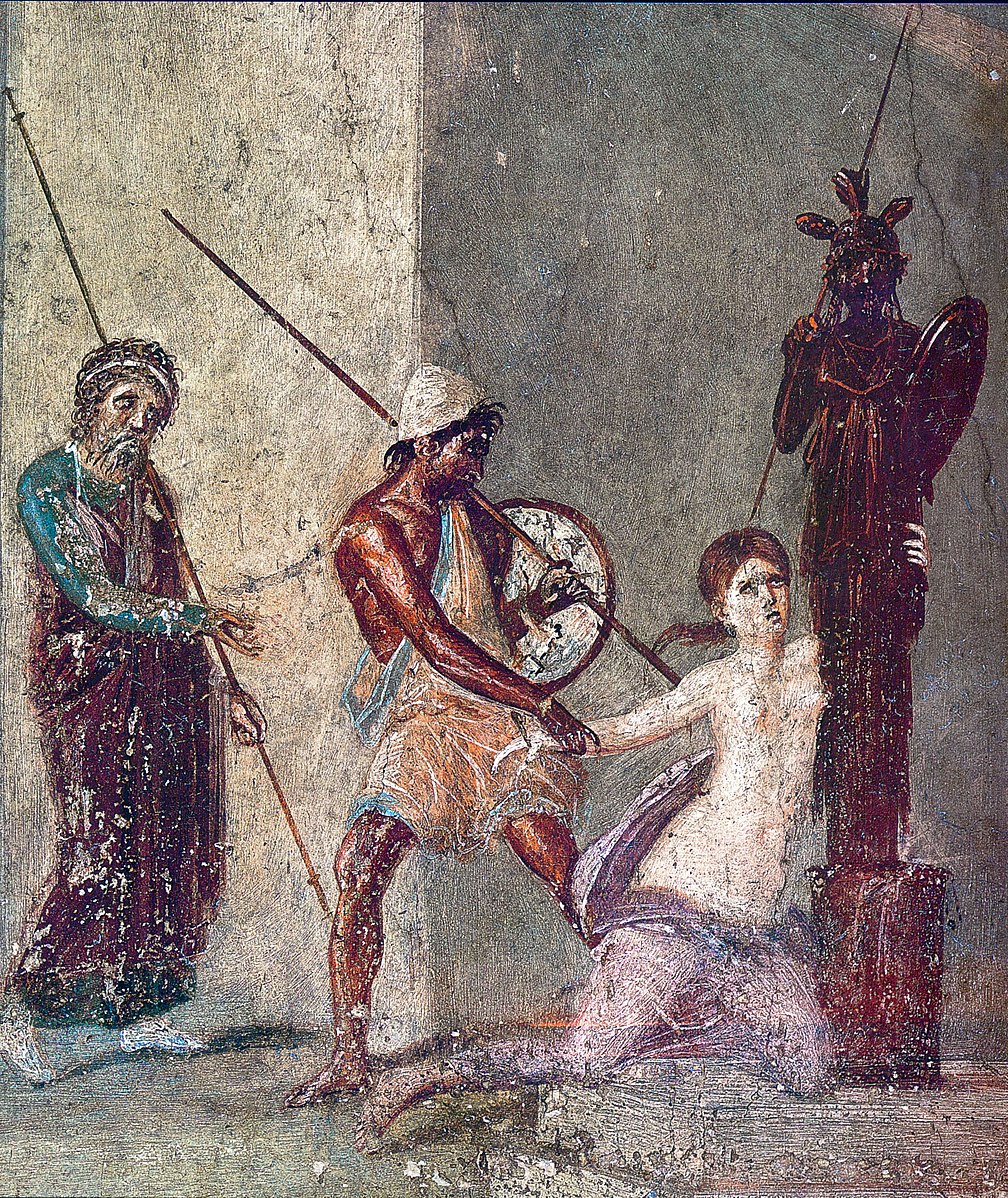
Priam watches Cassandra's rape (Pompeii)
- Aeneas's narrative (renewed trauma): "Queen, / you ask me to relive an anguish beyond words: / how the Greeks destroyed Troy's kingdom and her wealth. / I saw the piteous events myself—I played / no minor part" (2.2-6)
- Sinon's narrative of deception (Athena & Palladium, horse)?
Trojan Horse in Troy (2004)
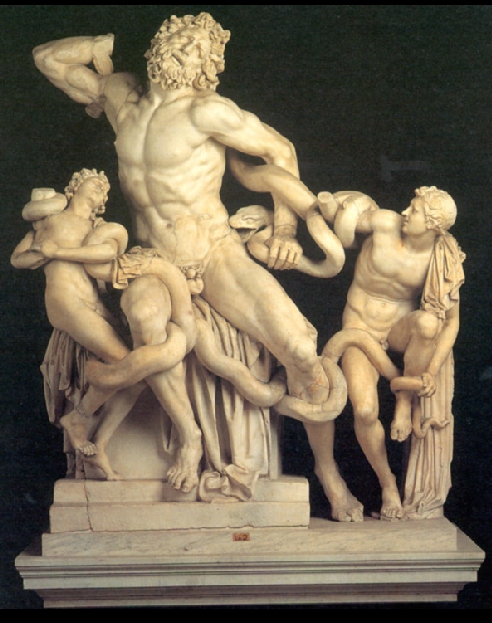

L: Laocoön & sons (1st century BCE Roman copy of Greek sculpture, ca. 200 BCE)
- (im)mobolized Aeneas's narrative of Troy's destruction: cf. traditional epic hero – narrative challenge? a reliable narrator? ("mixing in with the Greeks" & friendly fire, 3.396); "O Troy's ashes . . . I swear by you that as you fell I didn't run / from risk or Argive spears", 2.431-3; spectator at Priam's death, 2.469-558)
supernatural signs & guidance (hero of destiny):
(1) Hector’s ghost, "Get out . . . build . . . great walls", 2.270ff.); ancient commentator Servius's remarks on Aeneas's feigned ignorance of Hector's wounds & Dido's dream of Sychaeus
(2) Venus: after Priam's death (2.588ff.), reminder of family line, god-goggles ("Escape, my son, and give up your efforts")
(3) Iülus’s flaming head & shooting star (2.680ff.)
(4) Creusa’s ghost & blessing ("You'll . . . make it to Hesperia", 2.771ff.)
epic dreams, visions, prophecies: subject to human interpretation (characters & readers – choice)
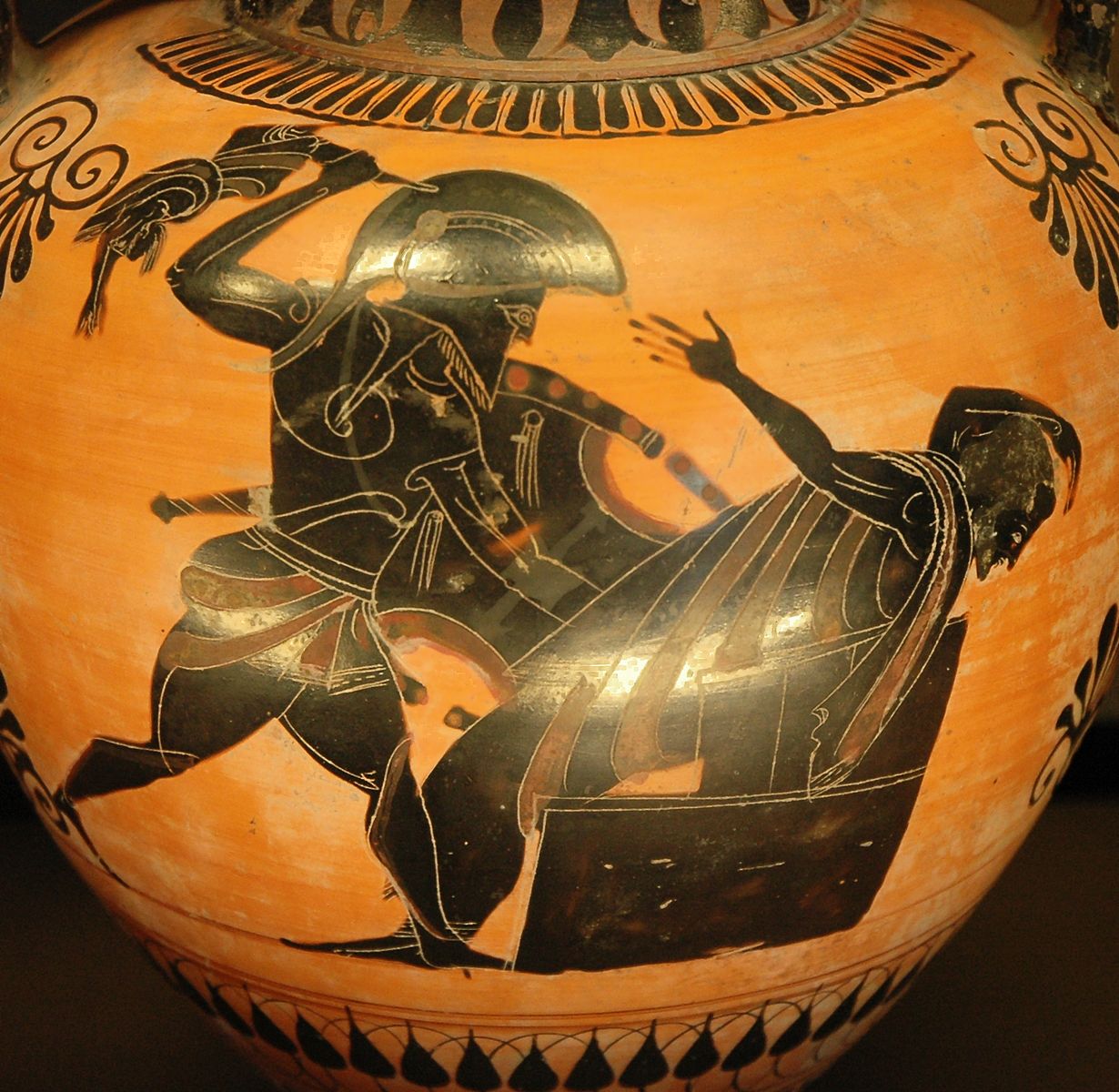
Pyrrhus kills Priam (Attic Amphora, 520-510 BCE)
- detailed account of King Priam's slaughter at altar of household gods (Pyrrhus worse than his father, 2.534ff.), Aeneas reminded of family, comrades disappeared, "exhausted and despairing, / they'd fallen off the roof, or stumbled into flames. /
I was the only one of them alive" (2.565-7)
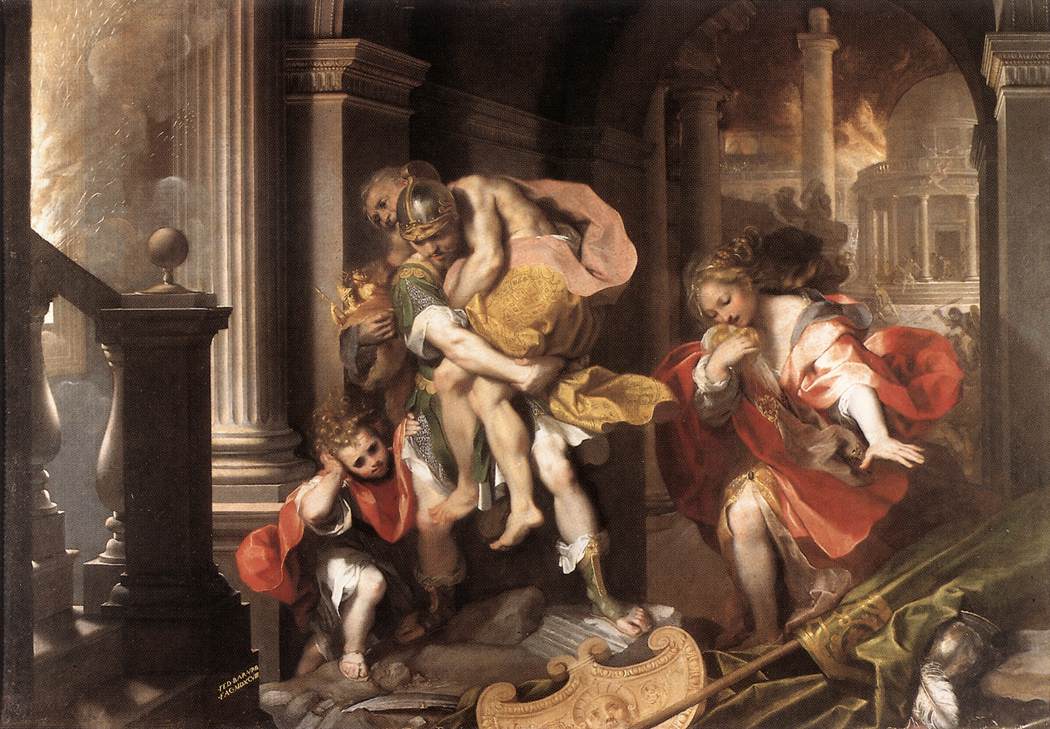
Frederico Barocci, Aeneas Flees Burning Troy (1598)
- departure from Anchises's house (2.707ff.) & loss of Creusa; Trojan refugees, Ascanius & Anchises: "No hope of help. / I gave up, lifted Father, and struck out for the hills" (2.803-4)
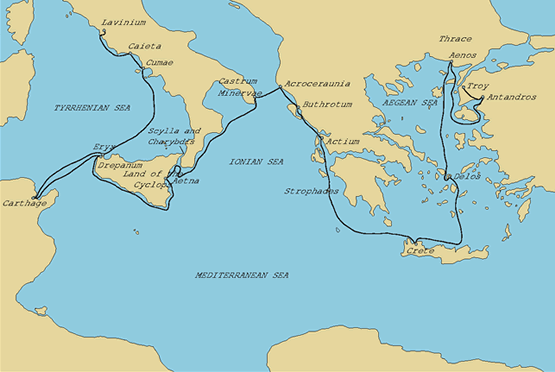
Google Map of Aeneas' Journey
- Aeneid 3: Trojan exiles' wanderings, false starts & stops, known past vs. fear of unknown future; less intense narrative between Aeneid 2 and 4, some overlap with Odysseus’ journey, but less fantastical & more historical (e.g. Actium & aetiology of Augustus’s Actian Games, 3.274ff.)
- Buthrotum (northern coast of Greek mainland): Helenus & Andromache – their story (Pyrrhus)? Site of Buthrotum?
- Helenus's prophecies (white sow & 30 piglets, Sibyl) & Andromache's trauma ("Polyxena was the luckiest, forced to die . . .", 3.321ff.; uncertain if Aeneas is real/alive – what's she doing in "a place for tears", 3.306?)
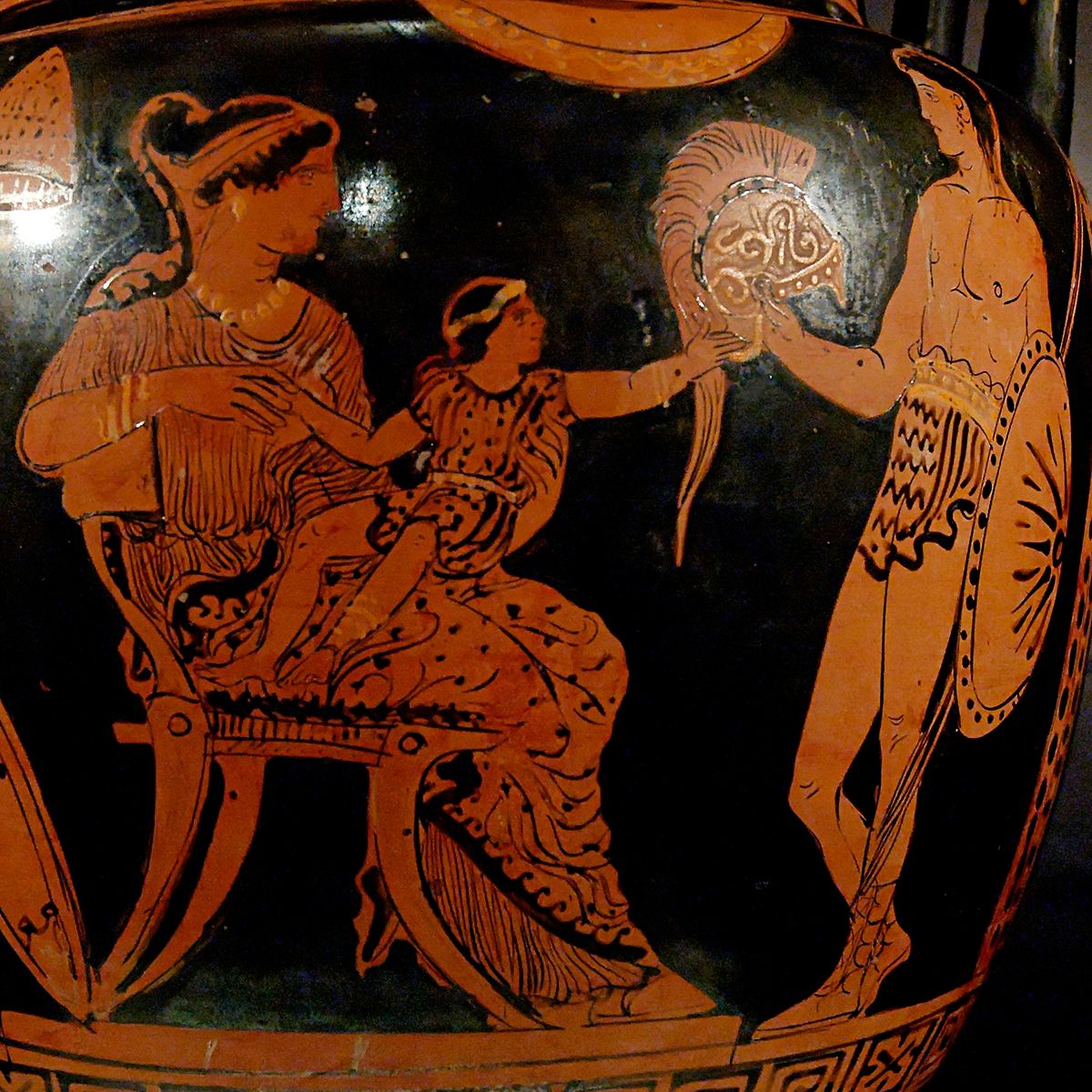
Andromache, Astyanax, Hector (Apulian vase, 370-360 BCE)
Aeneid 3.482-505 (Trojans' departure)
Andromache was also sad at this last parting.
She brought out garments sewn with gold embroidery,
and a Trojan cloak for Iülus, just as lovely.
Heaping him with gifts of cloth, she said, "Take these
too, my boy: they're testimony to my craft
and the lasting love of Hector's wife,
Andromache. Accept these last gifts of your people,
you, my sole surviving image of Astyanax.
His eyes, his hands and mouth were just the same,
and now he'd be a young man of your age."
I wept as I spoke my parting words:
"Live well, you whose fate has been fulfilled
while we are called from destiny to destiny.
You've won your relief. There's no sea to plow,
no fields of Italy to seek as they recede.
I pray that you have better fortune in your
second Xanthus and the Troy built by your hands."
- end of Aeneid 3: death of Anchises at Drepanum, Sicily; storm drives Trojans to Carthage; Aeneas's tale of wanderings finished at banquet
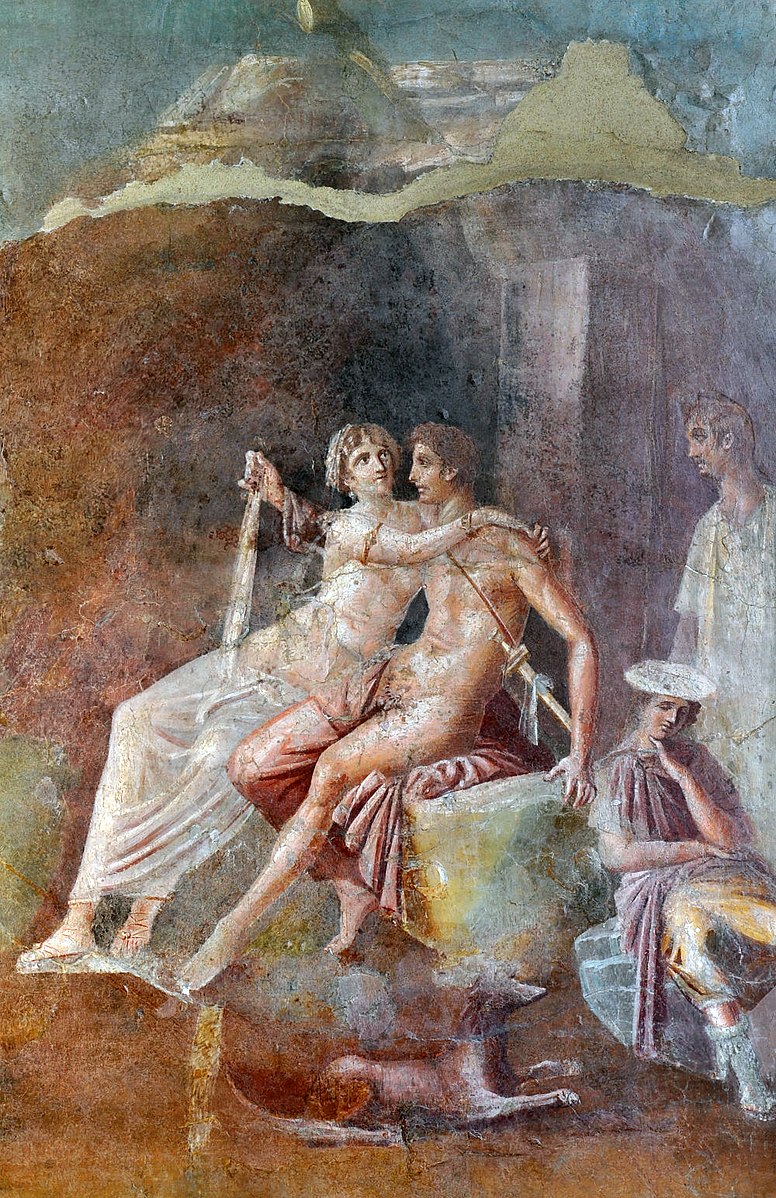
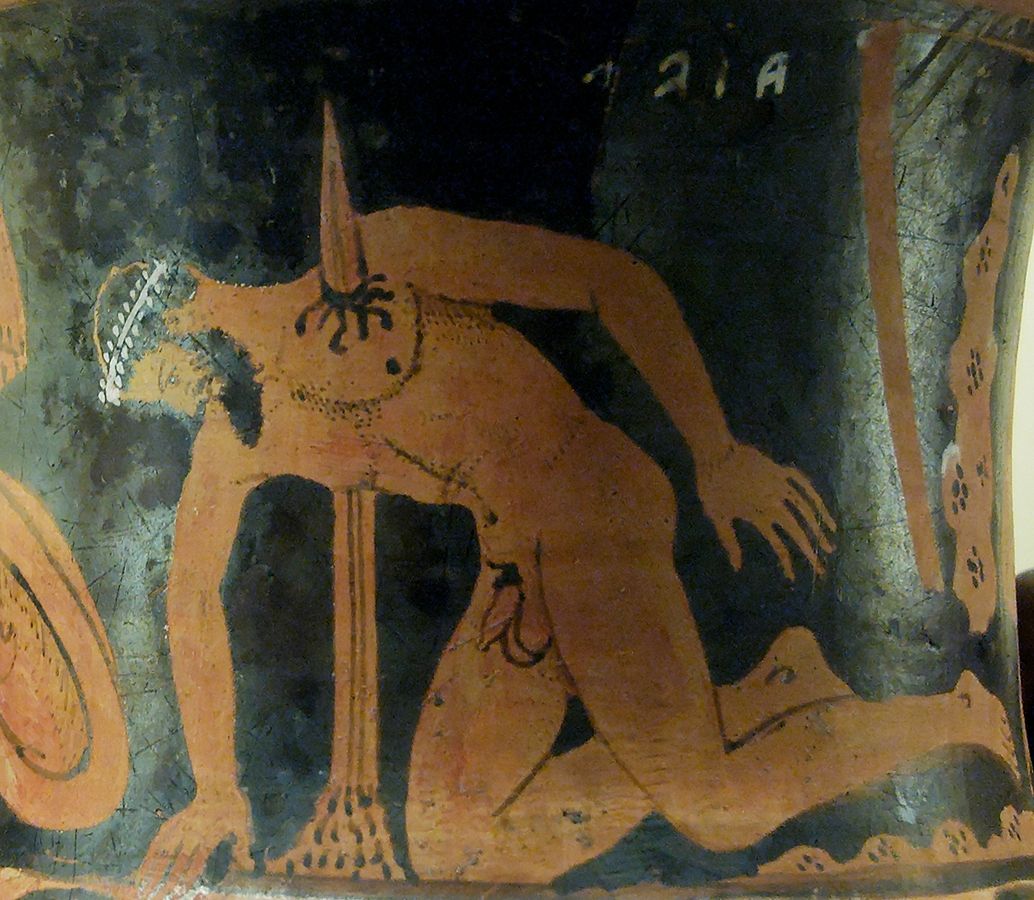
L: Dido and Aeneas fresco (Pompeii, 1st century CE); R: Suicide of Ajax (Etrurian calyx-krater, ca. 400-350 BCE)
- Aeneid 4: tragedy of Dido (elaborated by Vergil); queen/leader/colonist turned tragic figure; female helper abandoned by ungrateful male hero (e.g. Jason, Theseus); Dido's tragic madness/suicide (cf. uncompromising heroes of Homer & Greek tragedy, esp. honor/shame of Sophocles’s Ajax); Dido to Anna (plea to Aeneas), "I just need time for peace and space for passion, / until fortune teaches me to bear my loss" (4.433-4)
- Dido's conflicted self – idealism vs. pragmatism: Sychaeus's memory (univira, "woman with one husband"; "The man who first married me / Still has my love. Let him guard it in his grave", 4.28-9; marble temple, 4.457ff.; cf. Andromache); infatuation with Aeneas ("now she hosted the same banquet when night fell, / and madly begged to hear his hardships once again", 4.76-7)
Aeneid 4.68-73 (Dido, deer simile)
Mad with love, she wandered
through the city—like a careless doe pierced by
a shepherd's arrow from afar as he roams
the Cretan forest with his bow. Unknowing,
he leaves the shaft behind; she bolts through Dicte's
groves, the fatal arrow in her flank.
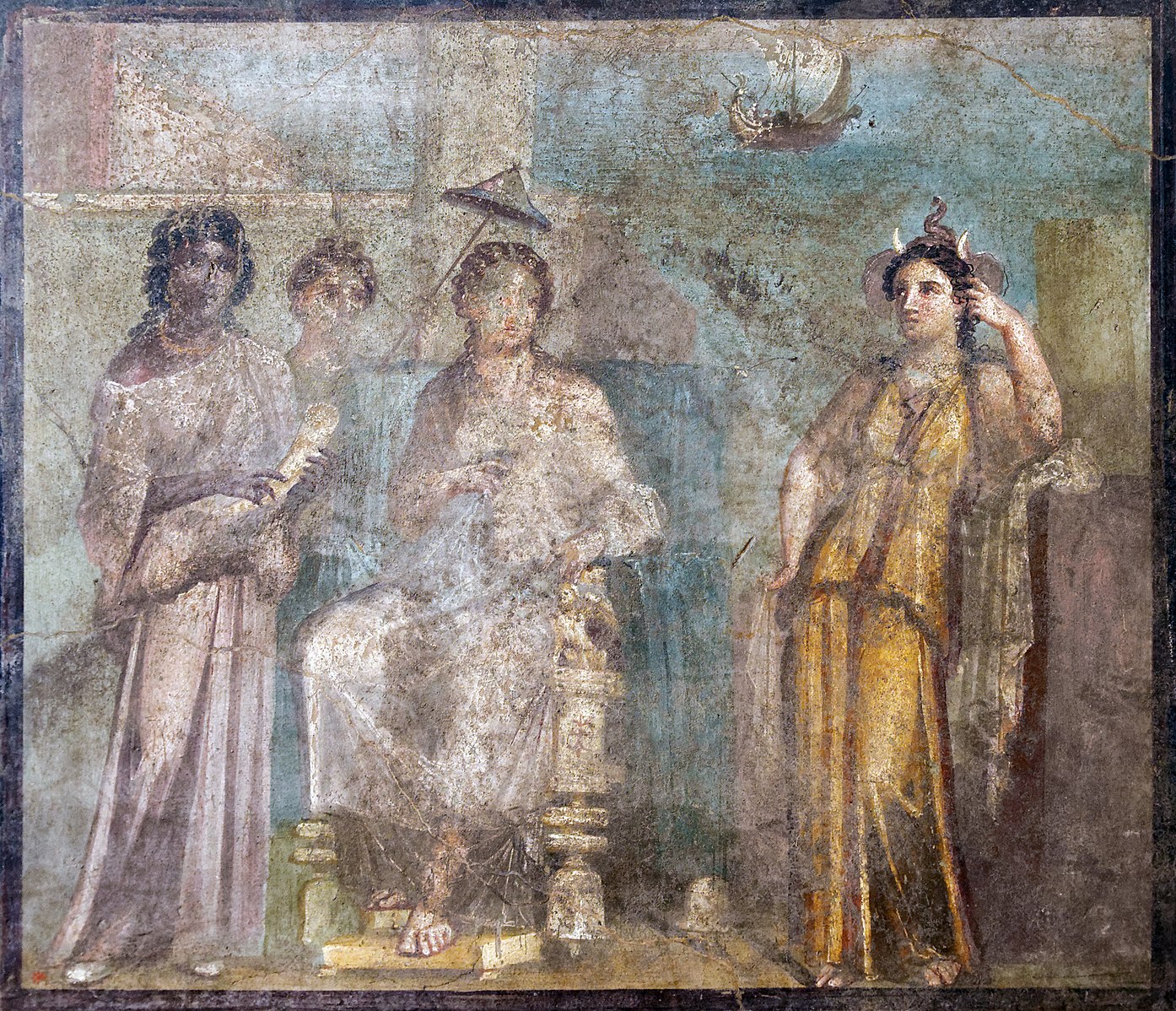
Dido and personified Africa (Pompeii)
- Vergil's Dido: subjective style (vs. “objective” style of epic narrator), emotional engagement with characters (apostrophe); narrator may embed subjective viewpoint of character (narrative focalization)
Aeneid 4.397-412 (Dido watches the Trojans' preparations from her tower, ant simile)
Now the Trojans fell to work in earnest.
Eager to escape, they pulled the ships to shore,
set afloat the pitch-smeared keels, and brought in
leafy branches from the woods for making oars.
You could see them swarming all over the city: [focalization]
like ants, when they pillage a huge heap of grain,
mindful of the winter, and store it in their home:
a long black stream hauls plunder through a narrow
pathway in the grass.
Some roll giant grains,
pushing with their shoulders; others mind the line
and chastise stragglers. The pathway teems with work.
What did you feel then, Dido, as you watched? [apostrophe]
How did you grieve, seeing from your citadel
the bustle on the shore before your eyes,
seeing the bay alive with so much shouting?
Cursed love, you make us stoop to anything.
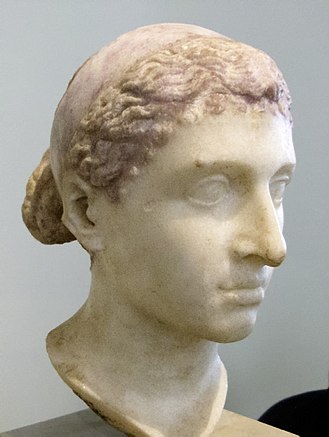
Sculpture of Cleopatra VII (mid-1st century BCE)
- narrator's moralizing, e.g. "Juno . . . saw Dido / in the fever's grip, saw her reputation / would be no block to passion", 4.90-1; civic consequences for Carthage (4.86-9)?
Aeneid 4.160-72 (the hunt & mysterious (non-)marriage; Juno & Venus)
Meanwhile the sky begins to change. Loud rumblings
bring on a sudden storm of rain and hail.
They scatter through the fields—the Trojan men,
the band of Tyrians, and Venus' Dardan grandson,
cowed and seeking cover; torrents run down the hills.
Dido and the Trojan prince reach the same cave.
Ancient Earth and Juno, goddess over marriage,
give the signal. Lightning flashes, nymphs howl
[ulularunt; cf. assault on Priam's palace (2.487-8)]
from the hills, the sky is witness to the wedding.
This was the first day of death, the first cause
of ruin. She's unmoved by rumor or appearance
and no longer plans to hide her love: she says
they're wed. With this word she masks her fault.
- male gods, Jupiter & Mercury: Aeneas, "acting the good husband" (4. 266) & forgetful of destiny; Mercury's second appearance, "Females are a fickle thing, / always prone to change", 4. 569-70); Dido's Epicurean skepticism re Aeneas's report of message, "As if the gods lose sleep or worry over this!" (4.379)
Aeneid 4.259-67 (Iarbas's complaint provokes Jupiter, Mercury confronts Aeneas)
As his winged feet lit down by the city outskirts,
he saw Aeneas building forts and homes.
The sword he wore was starred with tawny jasper,
the cloak clasped on his shoulders gleamed with purple dye,
a gift rich Dido wove for him, working his cloth
with golden thread. Mercury accosted him.
"So, you lay foundations for high Carthage?
Building a fine city, acting the good husband?
You forgot your kingdom and your fate! . . ."
- Dido vs. Aeneas – debate (4.296ff.)?
- Dido's knowledge of alternative Aeneas story? (self-address: "Poor thing, don't you / know or feel the treachery of Trojans yet?", 4.541-2; "Poor Dido, do his impious actions touch you now?", 4.596)
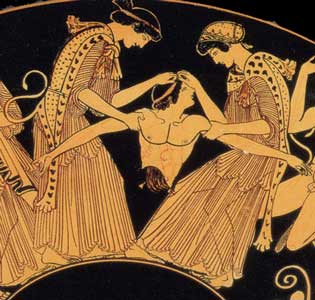
Pentheus dismembered (Attic red-figure vase, 480 BCE)
- Dido's descent into tragic despair after Anna's appeal to Aeneas fails: ". . . she seemed to hear her husband's voice, / calling her when dark night held the earth . . . She always found herself / alone on a long road, in a frenzy, / looking for her Tyrians in desert lands, / like mad Pentheus . . . or like Orestes / in a play" (4.460ff.)
- Dido's self-blame: "I broke the vow I made Sychaeus' ashes" (4.552); pyre & pretense of magical rite
- Dido's curse (aetiology for Punic Wars): “Rise up from my bones, unknown avenger, / hunt the Dardan colonists with flames and swords", 4.625-6)
- "Fall of Carthage": Aeneas & Trojans figuratively (re)inflict their city's trauma on Carthaginians
Aeneid 4.667-71
Houses groaned with grief and women's wails,
and the sky echoed the clamor, as if Carthage
or ancient Tyre were falling, and the enemy
were in the city—raging fires rolling through
the homes of men and temples of the gods.













